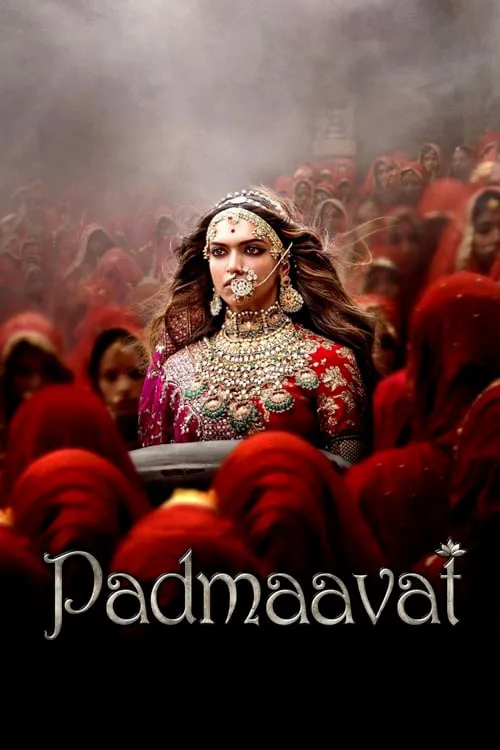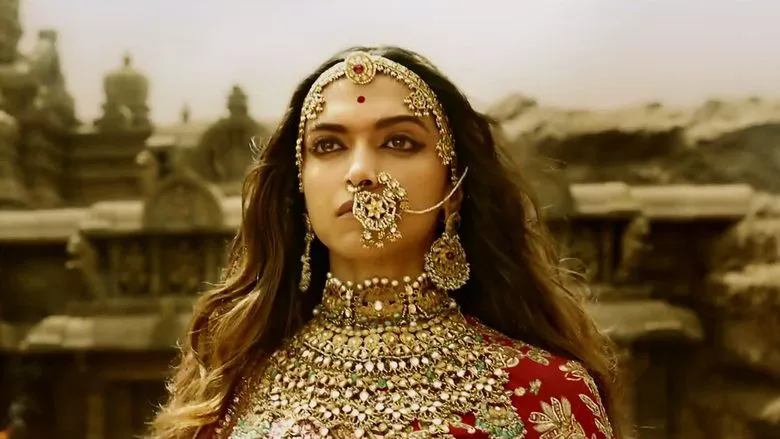Padmaavat

Plot
In the majestic landscape of Rajputana, India, during the 13th century, a tale of beauty, valor, and the unbreakable bonds of love unfolds. Padmaavat, a majestic epic directed by Sanjay Leela Bhansali, narrates the tale of Queen Padmavati, a stunningly beautiful queen of the Mewar kingdom, and the ruthless Sultan Alauddin Khilji, who becomes consumed by an insatiable desire for her. The film begins with a breathtaking opening sequence, showcasing the Mewar kingdom's grandeur under the reign of King Ratan Singh. The beautiful Queen Padmavati, also known as Padmini, sits atop a majestic peacock, symbolizing her exceptional beauty. As the story unfolds, it becomes apparent that Padmavati's allure not only charms her husband, but also the neighboring kingdoms. Alauddin Khilji, the ruthless Sultan of Delhi, witnesses Padmavati's breathtaking beauty and becomes captivated by her image. Khilji's descent into madness is a slow brew of obsession and greed, fueled by his desire for Padmavati. He sees her as the ultimate prize, a jewel that will solidify his power and reputation. The film takes the audience on a visual journey through the opulent courts and lavish festivals of the Rajput kingdoms, highlighting their chivalrous ways and fierce warrior spirit. Meanwhile, Padmavati and Ratan Singh share a deep and intense bond, built upon mutual trust and love. They live a life of simple elegance, far removed from the extravagance of the royal courts. However, their happiness is short-lived, as news of Khilji's increasing obsession reaches the Mewar kingdom. Khilji's messengers and spies continuously try to infiltrate the kingdom, and Padmavati becomes increasingly aware of the danger that looms in the shadows. Ratansen, the brave and valiant General of Mewar, takes it upon himself to prepare for battle, but Padmavati's husband prefers diplomacy to war. He believes that a peaceful resolution can be reached with Khilji, but the Sultan has no interest in negotiations. He sets his sights on capturing Padmavati by any means necessary, including treachery, deceit, and conquest. The film's climax is a poignant and powerful portrayal of the epic battle between the Mewar kingdom and the forces of Alauddin Khilji. Despite their superior numbers and arsenal, the bravest Rajput warriors lay down their lives in the defense of their kingdom and their queen. Padmavati's love and devotion towards her husband and people are a beacon of hope, and she ultimately makes the ultimate sacrifice to protect her kingdom and her honor. Padmaavat is a rich tapestry of colors, music, and action, woven together by the masterful vision of Sanjay Leela Bhansali. The movie is a tribute to the Rajput kingdoms, their warriors, and their people, who have left an indelible mark on Indian history. It is also a reminder of the enduring power of love and devotion, which can move mountains and transcend the boundaries of life and death. In many ways, Padmaavat is a reflection of the turmoil and conflict that plagued the 13th century India. It is a testament to the Rajput people's courage, honor, and sacrifice, as they fought to preserve their kingdom, their way of life, and their values. The film is a visual spectacle that is both breathtaking and heart-wrenching, a cinematic experience that will leave audiences spellbound and moved. The performances in Padmaavat are exceptional, with Deepika Padukone shining as the enigmatic and alluring Padmavati. Ranveer Singh brings to life the ruthless and cunning Alauddin Khilji, and Shahid Kapoor delivers a nuanced and emotional portrayal of King Ratan Singh. The film's costumes, set design, and cinematography are also noteworthy, transporting the audience to a bygone era of grandeur and opulence. In conclusion, Padmaavat is a majestic epic that pays tribute to the Rajput kingdoms and their people. It is a powerful tale of love, honor, and sacrifice, told through a rich tapestry of colors, music, and action. The film is a visual spectacle that will leave audiences spellbound and moved, a testament to the enduring power of the human spirit.
Reviews
Recommendations





